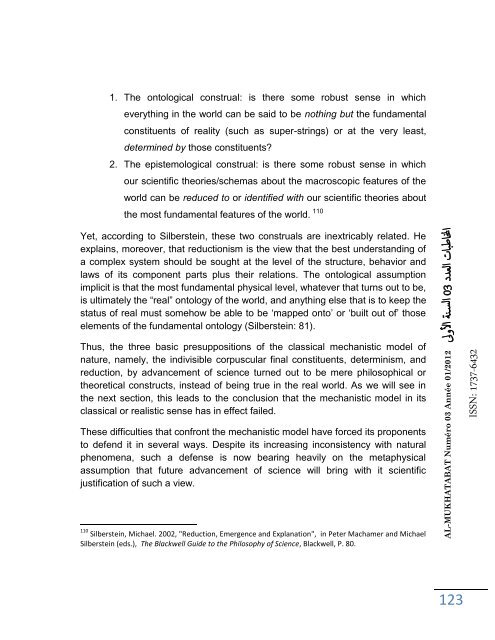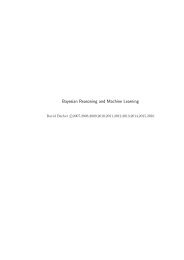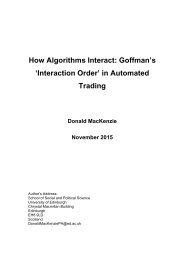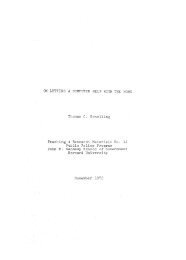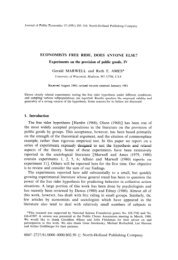n3-al-mukhatabat-journal
n3-al-mukhatabat-journal
n3-al-mukhatabat-journal
You also want an ePaper? Increase the reach of your titles
YUMPU automatically turns print PDFs into web optimized ePapers that Google loves.
1. The ontologic<strong>al</strong> constru<strong>al</strong>: is there some robust sense in which<br />
everything in the world can be said to be nothing but the fundament<strong>al</strong><br />
constituents of re<strong>al</strong>ity (such as super-strings) or at the very least,<br />
determined by those constituents?<br />
2. The epistemologic<strong>al</strong> constru<strong>al</strong>: is there some robust sense in which<br />
our scientific theories/schemas about the macroscopic features of the<br />
world can be reduced to or identified with our scientific theories about<br />
the most fundament<strong>al</strong> features of the world. 110<br />
Yet, according to Silberstein, these two constru<strong>al</strong>s are inextricably related. He<br />
explains, moreover, that reductionism is the view that the best understanding of<br />
a complex system should be sought at the level of the structure, behavior and<br />
laws of its component parts plus their relations. The ontologic<strong>al</strong> assumption<br />
implicit is that the most fundament<strong>al</strong> physic<strong>al</strong> level, whatever that turns out to be,<br />
is ultimately the “re<strong>al</strong>” ontology of the world, and anything else that is to keep the<br />
status of re<strong>al</strong> must somehow be able to be ‘mapped onto’ or ‘built out of’ those<br />
elements of the fundament<strong>al</strong> ontology (Silberstein: 81).<br />
Thus, the three basic presuppositions of the classic<strong>al</strong> mechanistic model of<br />
nature, namely, the indivisible corpuscular fin<strong>al</strong> constituents, determinism, and<br />
reduction, by advancement of science turned out to be mere philosophic<strong>al</strong> or<br />
theoretic<strong>al</strong> constructs, instead of being true in the re<strong>al</strong> world. As we will see in<br />
the next section, this leads to the conclusion that the mechanistic model in its<br />
classic<strong>al</strong> or re<strong>al</strong>istic sense has in effect failed.<br />
These difficulties that confront the mechanistic model have forced its proponents<br />
to defend it in sever<strong>al</strong> ways. Despite its increasing inconsistency with natur<strong>al</strong><br />
phenomena, such a defense is now bearing heavily on the metaphysic<strong>al</strong><br />
assumption that future advancement of science will bring with it scientific<br />
justification of such a view.<br />
110 Silberstein, Michael. 2002, "Reduction, Emergence and Explanation", in Peter Machamer and Michael<br />
Silberstein (eds.), The Blackwell Guide to the Philosophy of Science, Blackwell, P. 80.<br />
AL-MUKHATABAT Numéro 03 Année 01/2012 لىولأا ةن سلا 30 ددعلا تابطانا<br />
123<br />
ISSN: 1737-6432


